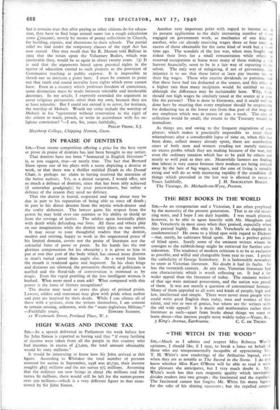IN PRAISE OF DENTISTS
Sri,—Your recent competition offering a prize for the best verse or prose in praise of dentists has just been brought to my notice.
That dentists have not been "honoured in English literature" is, as you suggest, true—or nearly true. The fact that Bernard Shaw opens one of his plays with a scene depicting a dentist at work, or that there was a thriller entitled Death in the Dental Chair, is perhaps no claim to having received the attention of the better authors. Yet, as a dental surgeon, I would offer, not so much a defence of dentists, since that has been ably achieved (if somewhat grudgingly) by your prizewinners, but rather a defence of the reason they need no defence.
That the doctor is feared, respected and sung about may be due in part to his reputation of being able to stave off death ; in part to his direct descent from the mystic witch-doctor and the crafty alchemist. The lawyer gains his respect from the power he may hold over our enemies or his ability to shield us from the revenge of justice. The soldier again heroically plays with death while defending our lives. All these and others play on our imaginations while the dentist only plays on our nerves.
It may occur to your thoughtful readers that the dentist, modest and retiring, happy to work in the sequestered peace of his limited domain, covets not the praise of literature nor the colourful fame of prose or poem. In his hands lies the one glorious compensation for his obscurity ; it is given to him to put at rest that part of the body which has caused more distress in man's varied career than aught else. At a word from him the mouth is rendered quiet and impotent. In his chair kings and dictators are silenced, the persuasive rhetoric of politicians is quelled and the flood-tide of conversation is stemmed as by magic. Even the vapid prattling of the less intelligent women is hushed. What more need a man ask? What compared with this power is the fame of literary recognition?
The doctor may need or crave the glory of printed praise. Lawyer, soldier and statesman may glow with pride when author and poet are inspired by their deeds. While I can silence all of these with a gesture, even the writers themselves, I am content to remain unsung, unknown, with the "mute inglorious Miltons."
—Faithfully yours, EDWARD SAMSON. .r.t Weymouth Street, Portland Place, W. I.


































 Previous page
Previous page